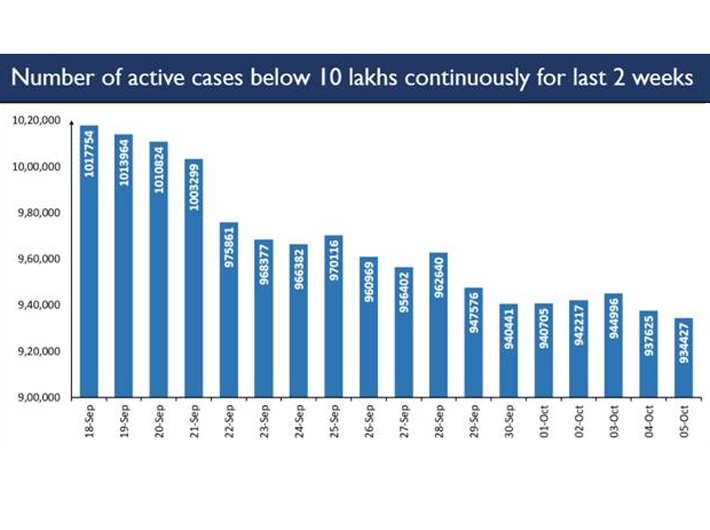India has a reason to hope after a long while: the number of active Covid-19 cases in the country has remained below 10 lakh for 14 consecutive days.
The development arrests a worrisome trend. The month of September had seen the number of new infections spiking up way above 75,000 and remaining above 90,000 for some days, breaking worldwide records. India was ahead of the US and Brazil in the number of new cases for most of recent weeks.
The number of active cases, meaning those currently under treatment and not counting those who have recovered, is considered a critical parameter in gauging the spread of the pandemic. On that count, on Monday, India has crossed the landmark. The number of active cases has remained the below the 10 lakh mark for 14 days unabated.
As many as 76,737 recoveries have been registered in the 24 hours to Monday morning in the country whereas the new confirmed cases stand at 74,442. The new recoveries have exceeded the new cases in the recent days. India’s total recoveries stands at 55,86,703.
The higher number of single day recoveries has resulted in sustained increase in the national recovery rate, currently pegged at 84.34%.
Some 75% of new recovered cases are recorded in 10 states and UTs. Maharashtra alone has contributed more than 15,000 to the new recovered cases followed by Karnataka and Andhra Pradesh with more than 7,000 cases each.
The active cases in India are 9,34,427. As on date, the active cases contribute only 14.11% to the positive caseload of the country. This is following a progressively downward trend. 10 states/UTs account for 77% of the active cases.
A total of 74,442 new confirmed cases have been reported in the 24 hours in the country.
As many as 78% of the new cases are concentrated in ten States/UT. Maharashtra has reported more than 12,000 of the new cases. Karnataka contributed more than 10,000. At least 903 deaths have been registered in the 24-hour period. About 82% of new fatalities are reported from 10 States and UTs.
As many as 36% of deaths reported yesterday are from Maharashtra with 326 deaths followed by Karnataka with 67 deaths.
The centre’s strategies of ‘Test Track Trace Treat Technology’ have been followed by the state/UT governments, as part of the ‘Whole of Government’ approach, the health ministry said in a release on Monday. Early identification of the cases through aggressive and accessible countrywide testing combined with other measures such as prompt and efficient tracking and tracing of the contacts have borne results.
Despite the extended weekend, India has posted high daily testing numbers over Thurday-Friday-Saturday with 10,97,947, 11,32,675 and 11,42,131 tests respectively. There has been an exponential rise in India’s daily testing capacities. More than 15 lakhs tests can be conducted every day. An average of 11.5 lakh tests were done on a daily basis during the past ten days.
The centre has issued the Standard Treatment Protocol which has ensured a standardised standard of treatment and cure across various hospitals and health facilities, public and private.
